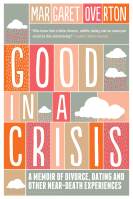 Good in a Crisis:
Good in a Crisis:
A Memoir of Divorce, Dating, and Other Near-Death Experiences
by Margaret Overton
In a day and age when publishing is obsessed with the glitz and glamor and shallow self-reflection from celebrities du jour, issuing memoir after memoir from eighteen-year-old pop stars, it is refreshing to read a truly moving memoir from a real person who has lived a real life.
Margaret Overton, an anesthesiologist working in Chicago, went through a grueling six years—six years marked by a bitter divorce, the deaths of friends and loved ones, a near-death experience of her own, a rape, and the quotidian ups and downs of middle age. She writes about these experiences in her funny, touching memoir Good in a Crisis, published in paperback earlier this year.
A really good memoir is hard to find, especially at a time when so many titles in the genre are little more than celebrity voyeurism. One of the things that makes Good in a Crisis so powerful is that it is written by a real woman who faces real problems in a very real way, stumbling and fumbling through life, sometimes crying, sometimes laughing. Overton’s memoir feels honest and authentic as she shares with her readers the bitter, trying moments of her life that sent her into a deep depression as well as the lighter, ridiculous moments that kept her from completely losing it.
Overton, who earned an MFA in writing from the School of the Art Institute of Chicago, has hit a home run with Good in a Crisis, her first book. Much more than a mere retrospective of a difficult time in her life, Good in a Crisis allows the reader to see how Overton transforms herself from a forty-something suburbanite trapped in a loveless marriage to an independent woman who realizes she is much more than a wife and a mother. As her marriage fails and her children move off to college and beyond, Overton is forced to build a life in a new reality, a reality that includes dating, taking care of her ill mother, and navigating a revived career.
It is in the telling of this transformation that Overton shines. She is able to find humor in darkness. She is able to expose the serious in the ridiculous. She is not afraid to examine herself or to reveal herself as she makes her way through rough patch after rough patch.
Overton’s experiences are at once unique and universal, and this is exactly what makes Good in a Crisis work so well. Divorce is not uncommon, and yet everyone’s experience with it is unique. Overton writes about her divorce in a way in which just about anyone could identify. She writes about the feelings of relief and failure, of anger and elation associated with her dissolving marriage. She writes about the death of friends and families in a way that makes readers ache not only for the deceased but for the author herself: How much pain does one woman have to go through?
This is a question that many have asked of themselves and of their friends. It can be painful to watch loved ones struggle through rough times. Overton muddles through more than her fair share of catastrophes, but she comes out on the other side stronger and more peaceful—not perfect, but better.
Good in a Crisis is rewarding and uplifting, provoking tears at times and laughter at times. It is perfectly balanced—introspective without being self-indulgent, inspiring without being condescending. Overton’s book should be required reading for anyone stumbling through middle life, if not to better understand themselves, then to acquire perspective on the real-world struggles of those around them.
January 2014, Bloomsbury USA
Memoir
$16, paperback, 240 pages
ISBN: 978-1-4088-3055-0
—Reviewed by Kelli Christiansen









